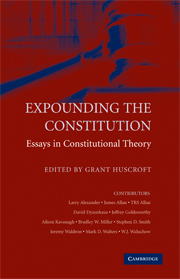Book contents
- Frontmatter
- Contents
- Preface
- Contributors
- Introduction
- PART I MORALITY AND THE ENTERPRISE OF INTERPRETATION
- 1 What Does Constitutional Interpretation Interpret?
- 2 Do Judges Reason Morally?
- 3 Constitutional Morality and Bills of Rights
- 4 Justification and Rights Limitations
- PART II JUDICIAL REVIEW, LEGITIMACY, AND JUSTIFICATION
- PART III WRITTEN AND UNWRITTEN CONSTITUTIONAL PRINCIPLES
- Index
3 - Constitutional Morality and Bills of Rights
Published online by Cambridge University Press: 25 July 2009
- Frontmatter
- Contents
- Preface
- Contributors
- Introduction
- PART I MORALITY AND THE ENTERPRISE OF INTERPRETATION
- 1 What Does Constitutional Interpretation Interpret?
- 2 Do Judges Reason Morally?
- 3 Constitutional Morality and Bills of Rights
- 4 Justification and Rights Limitations
- PART II JUDICIAL REVIEW, LEGITIMACY, AND JUSTIFICATION
- PART III WRITTEN AND UNWRITTEN CONSTITUTIONAL PRINCIPLES
- Index
Summary
TWO CONCEPTIONS OF MORALITY
To what kind of norms does a court refer in justifying its claim that a statute is constitutionally invalid because it unjustifiably infringes “equality before and under the law,” or violates “the right to life, liberty and security of the person” in a manner that fails to comport with “the principles of fundamental justice?” Presumably, the norms in question are norms of political morality. But what exactly are these? Are they the norms moral philosophers often dispute – that is, norms that purport to be universal, valid, rationally justified, or maybe even “objectively true,” much as Kant and Plato thought? Are they perhaps something more modest than this – for example, the norms of conventional or positive morality, rooted not in the fabric of the universe, but in the variable beliefs and convictions of a particular community? Or are they something else entirely? Debates about bills of rights and judicial review – as well as debates among legal philosophers concerning the various relations between law and morality – have been curiously silent on this important question. It is well past time to draw attention to it, however, if only because the answer one gives can seriously affect one's assessment of bills of rights and the various practices of judicial review to which they give rise.
In addressing this neglected question, I will use as my point of departure a popular complaint one often hears in both academic and popular discourse.
- Type
- Chapter
- Information
- Expounding the ConstitutionEssays in Constitutional Theory, pp. 65 - 92Publisher: Cambridge University PressPrint publication year: 2008
- 5
- Cited by



